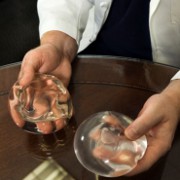 Photo: Getty Images
Photo: Getty Images
Last week’s news that the U.S. Food and Drug Administration is exploring a link between breast implants and cancer touched off a mini brouhaha in the media. It’s understandable. Sounding the alarm about new cancer risks is one of the favorite pastimes of some journalists, and, let’s face it, breast implants have been controversial since their introduction decades ago.
But before you race off to your doctor’s office, here’s some additional information on the FDA announcement.
The FDA’s media advisory noted “a possible association between breast implants and the development of anaplastic large cell lymphoma (ALCL).” The piece went on to explain that ALCL is a type of non-Hodgkin’s lymphoma, not breast cancer, and that it’s very rare.
Just how rare?
The FDA knows of about 60 women across the globe who have silicone or saline breast implants and ALCL. The agency acknowledges this is a “very small fraction of the 5-10 million women who have received breast implants worldwide.”
So why all the noise?
The FDA believes that, although the risk is small, women with implants do have an elevated risk for developing ALCL. This is a type of cancer of the immune system cells that can be found almost anywhere in the body: the soft tissues, lymph nodes, liver, lungs, skin and bones. In augmented breasts, the cancer cells are found within the breast capsule, usually in fluid surrounding the implant.
Many factors influence the treatment options and prognosis of an ALCL patient, but many require at least some chemotherapy. Relapse can also be an issue with ALCL.
What is the FDA doing now?
The FDA has created a registry for ALCL patients with breast implants. The agency is asking physicians to report their cases online to enable the organization to collect data for further analysis. The FDA is also advising doctors treating patients with swelling around their implants to consider the possibility that ALCL is present.
In addition to gaining a better understanding of the incidence of ALCL in breast augmentation patients, the FDA will explore whether the type of implant cover (smooth or textured) or implant filling (silicone or saline) makes any difference in the rate of occurrence.
Because the risk of developing ALCL is so small, women with breast implants are not being advised to remove them. Neither is the FDA placing any kind of restriction on the marketing and use of implants.
What should you do?
The FDA advises you do nothing beyond your usual health care routine if you have breast implants. If you notice pain, swelling, lumps or asymmetry after you’ve completely healed from surgery, however, do see your physician.
If you’re concerned, start gathering more information here:
http://www.fda.gov/MedicalDevices/ProductsandMedicalProcedures/ImplantsandProsthetics/BreastImplants/ucm239995.htm





Add a CommentComments
There are no comments yet. Be the first one and get the conversation started!